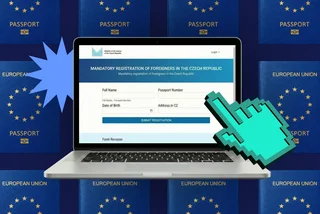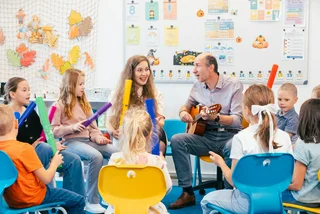This article is part of our new series on Parenting Abroad. Got a tip for parenting topics you'd like covered? Write to CS@expats.cz.
As a parent of two children in the Czech school system, I’ve had my fair share of surprises regarding how and what they learn about sex education. When my daughter, then in second grade, brought home her biology book, I wasn’t expecting the detailed anatomical drawings and discussions about sperm, eggs, and reproduction. It all felt quite progressive—more European than my own American upbringing, where sex ed typically involved little more than a condom and a banana, if we were lucky.
Between this early introduction to anatomy and Zdeněk Miler’s Little Mole picture book, with its crude yet cute rendering of rabbit conception and delivery, it seemed like my kids had far more opportunities to learn about the human body at school than their American cousins. (In Michigan, where I grew up, schools send parents a waiver allowing them to excuse their kids from sex ed entirely.)
I received no such waiver before my children were shown the trippy spectacle Once Upon a Time... Life: Birth in third grade. The French animated series, dubbed into Czech for local audiences, starts with a naked couple embracing, fusing, floating into the sky, and then morphing into a ball, which bursts into a shower of sparkles. Segue to an army of determined swimmers voyaging toward their target only to infiltrate the vaginal wall with lasers then morph into chromosomes with bowler hats and sex ed sorted, right?
Despite this vivid portrayal, since we’ve hit the tween years, I’ve found myself clarifying to my girls some of the more nuanced “gray areas” about exactly how the sperm gets to the egg (and that lasers don’t factor in). Recently, my oldest daughter, now 12, approached me with a look of confusion and mild terror.
She had heard something at school that made her question her understanding that sex was just for making babies. She was appalled when I explained that people did it for other reasons, like pleasure and love in the best of circumstances. “Does my teacher do it? Oh God, do you and Dad do it?” Clearly, something in both my approach as well the school's seemed to be lacking.
Half of Czech kids haven’t learned anything about sex
This lack of clarity isn’t just anecdotal. A 2020 report from the Czech Secondary School Union highlighted how the curriculum is often underdeveloped, with nearly half of students claiming they hadn’t learned anything meaningful about sex in school. This inconsistency is compounded by the fact that schools here have considerable discretion in what they teach about sex—it often depends on individual teachers’ comfort levels.
This means that some schools might only cover the bare minimum, such as sexually transmitted diseases (STDs) and pregnancy while leaving out broader, socially relevant topics like consent, relationships, and gender identity.
The Czech organization Konsent, which advocates for better sex education, believes, like most of us, that sex education should be a joint effort between schools and parents. As co-founder Johanna Nejedlová explains:
“Many schools cover topics like STDs or pregnancies, and that’s it. But it’s not that they don’t want to do more—the problem is that there are no materials, guidelines, exercises, etc.”
She goes on to point out that 47 percent of Czech youth claim they’ve learned nothing about sex at school, yet 80 percent of them feel it’s important and want to be educated about it in a school setting.
Konsent is working to fill this gap by creating interactive teaching materials that go beyond just the biological aspects of sex. It is helping teachers approach complex subjects like consent, gender identity, and sexual orientation with sensitivity and care, providing workshops and lesson plans to ensure that Czech students get a well-rounded understanding of sexuality.
Demand for better sex ed is growing
However, the disparity in sex education across Czechia remains. In some schools, boys and girls are still separated during lessons, and gender issues, such as non-binary identity, are either ignored or taught inadequately. As sociologist Lucie Jarkovská told ČTK, many schools only focus on basic hygiene or the mechanics of childbirth without addressing the questions that truly concern teenagers.
“To this day, there are schools that send boys home or give them free time during sex education. They tell girls something about hygiene products, threaten them to be careful, and explain how they give birth. The questions that bother teenagers are not addressed," said Jarkovská.
Recent research shows that the demand for sex education in Czech schools is growing. For instance, the non-profit organization Projekt Lajfr reported a 20 percent increase in demand for sex education courses in the 2023/24 school year.
According to Projekt Lajfr’s director, Lukáš Rychetský, this rise is due mainly to an increased societal focus on prevention, as well as pressure from parents who feel they lack proper sex education themselves. Despite this rising demand, many rural schools or those in excluded areas face a shortage of educators willing to teach the subject.

As the national conversation about the need for comprehensive sex education continues, the Czech curriculum still falls short of international standards, particularly when compared to Western and Northern European countries. These regions emphasize inclusivity, normalize discussions in homes and schools, and prioritize well-being and consent.
In my case, the Czech approach somewhat echoes my conservative Midwestern schooling: While Czechia is often seen as progressive, sex education here, like many other divisive topics, can be influenced by a small but vocal minority of conservative voices. As parents, it’s our responsibility to fill in the gaps for our kids. When you’re ready to do that, I've got a video to show you.












 Reading time: 4 minutes
Reading time: 4 minutes 
























